Not enough hours in the day? Forgetting who you are and why you are doing all this? You deserve to take time to think about how you are integrating your work and life. Perhaps these Gleeson Library resources can help.
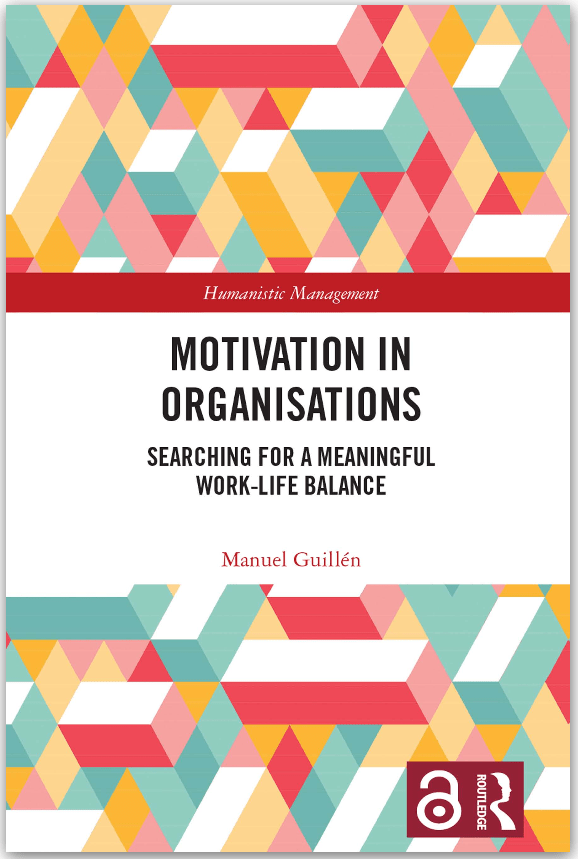
Motivation in organisations: searching for a meaningful work-life balance by Manuel Guillén (2020) (unlimited users, open access)
“a humanistic, methodical and more comprehensive exploration of the theories of motivation…a new map of human motivations based on the most recent empirical findings of the social sciences, in dialogue with the humanities.” (p. xviii)

The flourishing teacher: vocational renewal for a sacred profession by Christina Bieber Lake (2020) (unlimited users, subscription)
With a Christian perspective, “this book follows the deep logic of the seasons: academic, but also environmental and liturgical…to motivate you to think through the seasons of your year and your life as an educator in a new way.” (p.2)
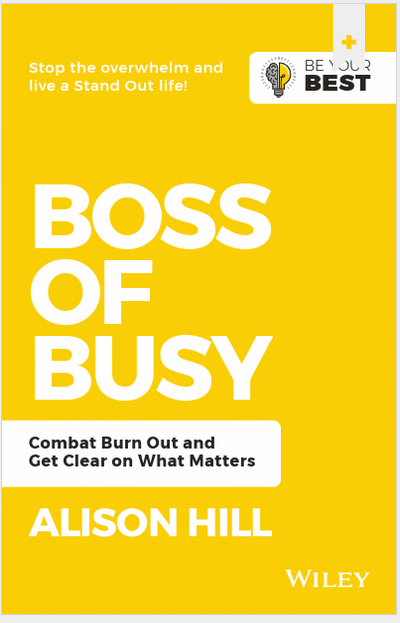
Boss of busy: combat burn out and get clear on what matters, Second edition by Alison Hill. (2019) (unlimited users, subscription)
Hill provides “science-based research” (p. xxiv) and asks you to “imagine having clarity about what really mattered to you at any given moment, and being able to make decisions based on that, rather than what’s urgent (or at least someone else’s urgent).” (p. xxv)

The calling: a 12-week science-based program to discover, energize, and engage your soul’s work by Julia Mossbridge (2019) (unlimited users, subscription)
“Define a process you’re interested in, Energize the process by building a model of it, and Engage the process and watch it change the world. [This] deep scientific method is magical. It is play with a purpose. It can…be applied to the processes we are focused on here: self-actualization and self-transcendence.” (p.4)
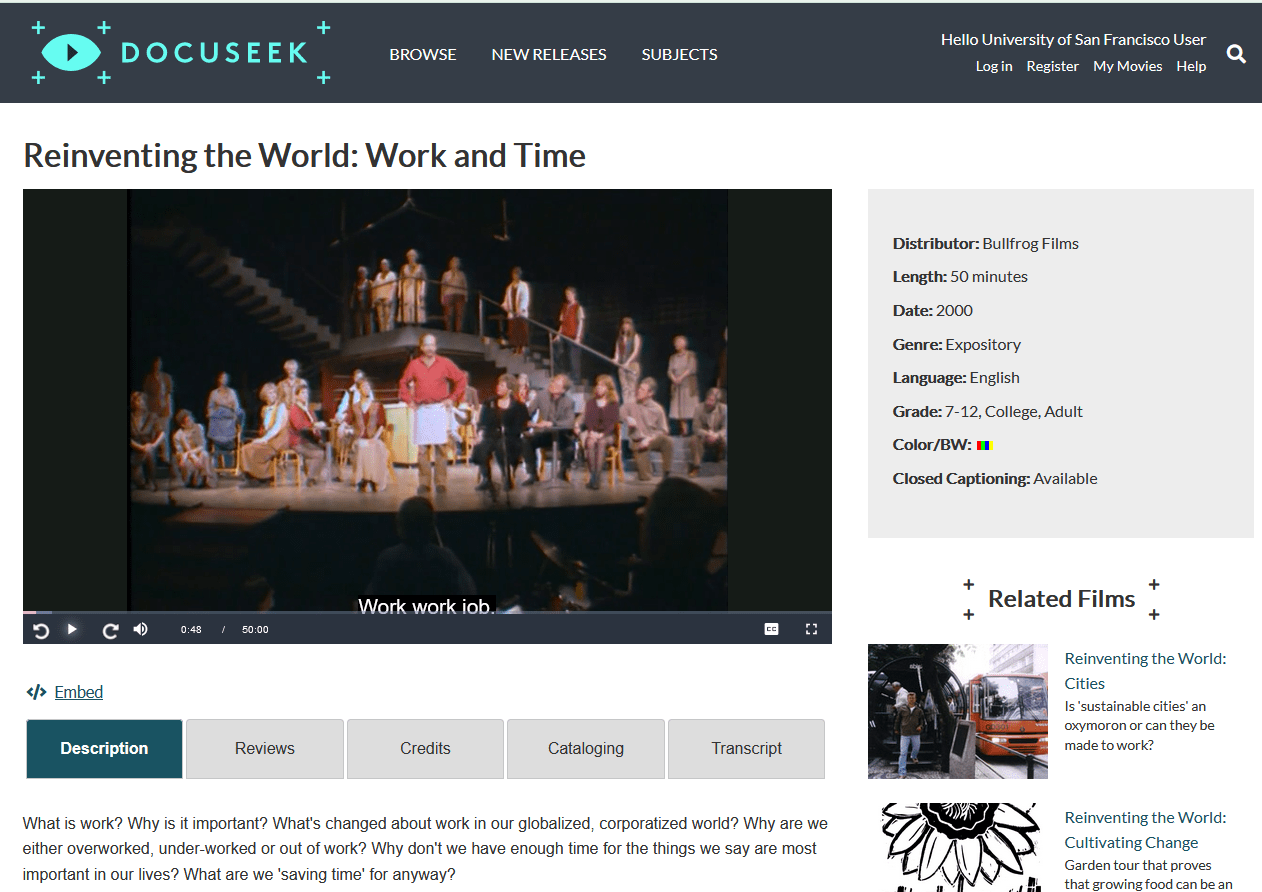
Work and time from Bullfrog Films (2000) (unlimited users)
“Jeremy Rifkin, Matthew Fox, Paul Hawken, Barbara Moses, Sally Lerner, Stewart Brand, and ‘El Vez’, the Mexican Elvis impersonator, are some of the people who offer ideas on what work and time mean and how we can get to a more equitable place in our lives.
Don’t miss The emotional self at work in higher education edited by Ingrid Ruffin and Charissa Powell (2021). Chapters include “The Academic Trinity: African American, Female, Leader” by Shannon D. Jones, Medical University of South Carolina; “Race, Imposter Thoughts, and Healing: A Black Man’s Journey in Self-Discovery While Working at a PWI” by Calvin Monroe, Saint Mary’s College of California; and “Building a Framework to Achieve Work-Life Balance: Advice From a Co-Working Couple by Amanda Richards and Don Richards, both of University of Tennessee, Knoxville. (unlimited users)
Other titles of interest:
- Mothers in academia edited by Mari Castañeda and Kirsten Isgro (2013) (unlimited users, subscription)
- Older women who work: resilience, choice, and change edited by Ellen Cole and Lisa Hollis-Sawyer (2021) (unlimited users)
- Gender, tenure, and the pursuit of work-life-family stability by Kristen E. Willmott (unlimited users, subscription)
- Balance is B.S.: how to have a work. life. blend. Tamara Loehr (2019) (unlimited users, subscription)
- “Meaningful Work” by Christopher Michaelson (2017) in The SAGE Encyclopedia of Business Ethics and Society
- Burnout to Breakthrough by Eileen McDargh (2020) (unlimited users, subscription)
Search “work life balance” in the library catalog for more books and videos.
Many of our databases have articles on this topic, including Sage Journals. For instance, try Keywords = work life balance AND Abstract = academic.
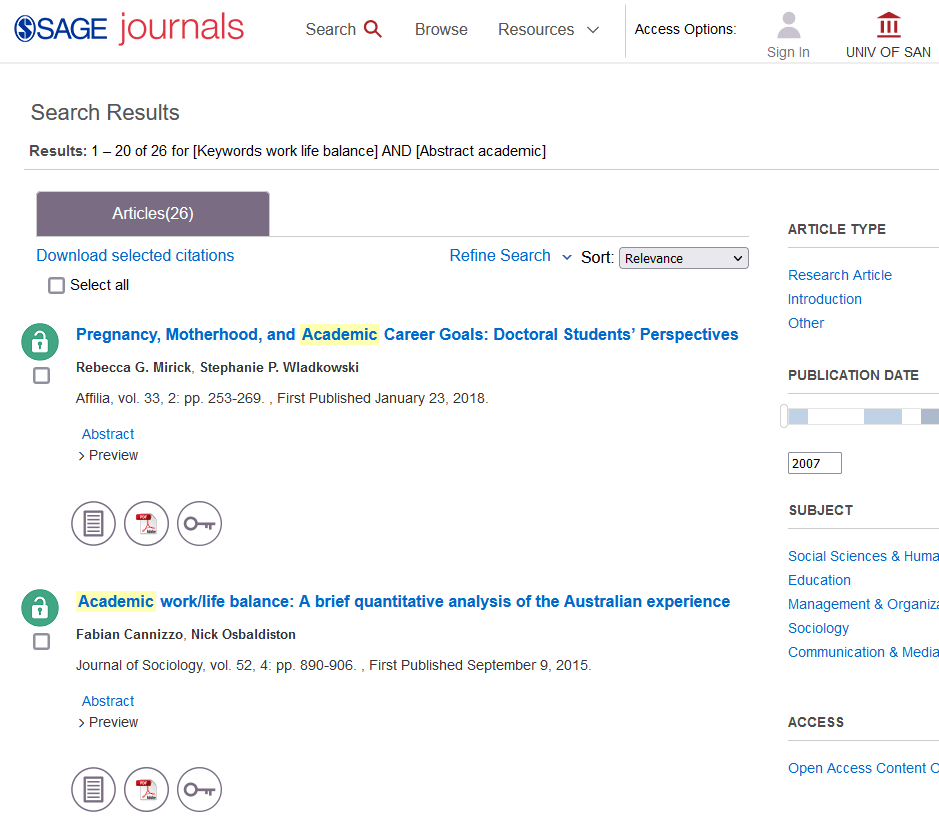
Take a look at Alt HealthWatch as well. Search on “work life balance” in this database.
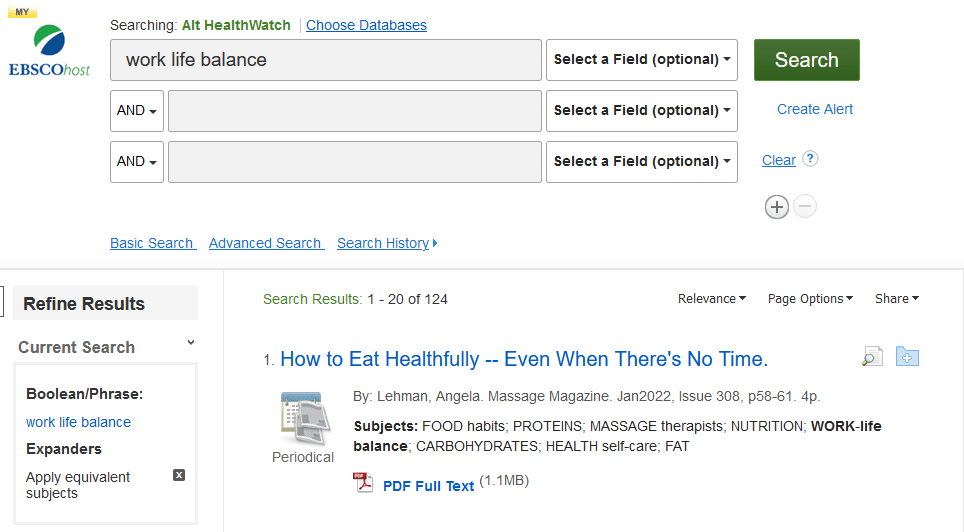
Revisit our blog post, Resources for Mental Health Action Day, from May 2021 for additional suggestions.
* It was a happy coincidence that Dr. Mossbridge’s book appeared in these search results. I just heard her speak on February 5, 2022, at the University of Toronto Interdisciplinary Symposium on the Mind (UTism). This year’s topic was Time and the Mind.
One of the research projects Dr. Mossbridge discussed was a web application her team called Time Machine. “Among other functionalities, Time Machine allowed people to record and listen to messages as if they were from and to their past and future selves.” It engaged with the idea that a person “feeling connected to a wise and loving future version of themselves” improves their wellbeing. I would love to try this Time Machine myself.
Mossbridge, J., Johnson, K., Washburn, P., Williams, A., Sapiro, M. (November 2021). Smartphone time machine: tech-supported improvements in time perspective and wellbeing measures. Frontiers in Psychology, 12. https://doi.org/10.3389/fpsyg.2021.744209
Dr. Mossbridge also talked about her studies into precognition: are humans able to perceive information from the future, even if we don’t usually notice that we are doing so? Her 2018 article reviews some related experiments and reminds the reader that “it is worth remembering that advances in psychology and physics have repeatedly demonstrated that everyday intuitions about the nature of reality only partially reflect the nature of reality itself.” (p.78)
Mossbridge, J. A., & Radin, D. (2018). Precognition as a form of prospection: a review of the evidence. Psychology of Consciousness: Theory, Research, and Practice, 5(1), 78-93. http://dx.doi.org/10.1037/cns0000121
For technical assistance in reading Ebooks, read our guide Using Ebooks.
